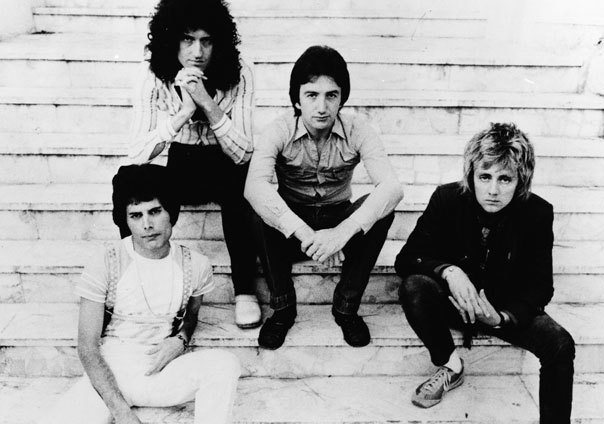The following year they went widescreen. Encouraged by the advances made by 10cc on their own tripartite pop operetta “Une Nuit A Paris” (from the Manchester band’s groundbreaking May 1975 album The Original Soundtrack), “Bohemian Rhapsody”, released in November 1975, took the basic elements of Queen (camp grandeur, strutting self-assurance, multi-layered ostentation) and distended them into a near six-minute rock operetta that divided listeners more than any record before or since.
From this point on Queen would be impossible to ignore. Everything about them (the anthems, the videos, the stadium tours, the rock-star lifestyles) would be consummated on a scale devoted to pushing the needle into the red. Understatement was anathema. Overstatement was their métier.
After “Bohemian Rhapsody”, Queen so finely tuned their sense of self-mockery that they were almost immune to censure. Mercury, in particular, managed to hone his personal style so it embraced both absolute conviction and a heightened sense of his own absurdity. This enabled him to turn a negative criticism to his own advantage. If the band were accused of shallowness, he’d say: “Of course, dear. We’re wonderfully shallow. Our songs are like Bic razors. Designed for mass consumption and instantly disposable.” Faced with the charge that Queen were pompous and preposterous, he’d gleefully accept the epithets as compliments: “All true, darling. We’re the most preposterous band that’s ever lived.”
He was no less playful when deflecting questions about his sexuality. In 1975, he came close to being outed when a US journalist who turned up to interview him in Ohio was shown into his hotel room 30 minutes early to find him reclining on a pile of cushions, waited on by a group of scantily-clad, muscular young hunks. “These are my servants, dear,” he bluffed.
Even on the occasions when he did encourage the rumours surrounding his sexual orientation, it went largely unnoticed. As in 1976 when, asked point-blank whether he was straight, bisexual or gay, he replied, “I sleep with men, women, cats, you name it.”
The truth was that, by the mid-’70s, Mercury was as confused as anyone about his sexuality. Though he’d been experimenting with men since the age of 14, he’d been in a long-term relationship with boutique owner Mary Austin since the late ’60s. According to his long-standing personal assistant, Peter Freestone, the seemingly incomprehensible lyrics of “Bohemian Rhapsody” are a thinly disguised attempt to resolve his personal situation at the time: still living with Austin, he had a regular boyfriend in music publisher David Minns, and an escalating interest in casual gay pick-ups.


